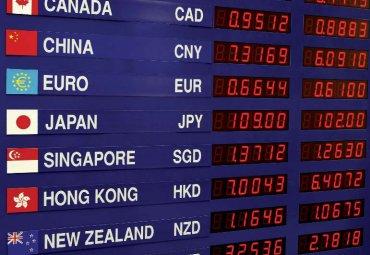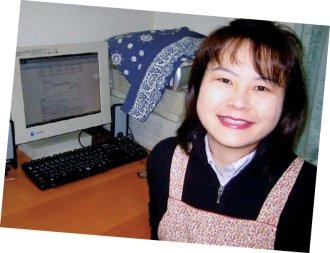Japanese Housewife Online Traders
By Antonia McLaughlin
 Currency markets: a popular option for amateur e-traders
Currency markets: a popular option for amateur e-traders
The Japanese housewife is an iconic and integral part of the Japanese populace. She holds much domestic power, often autonomously, while her husband is working all hours of the day and night. She also holds the purse strings of her husband’s salary which, according to some analysts, is an estimated ¥12.5 trillion in household savings. The Japanese housewife has recently taken on a whole new level of meaning, and is redefining the very concept of domestic housework in the form of online currency trading. With Japan’s interest rates so low which is discouraging households to save, the freshly lucrative, seemingly straightforward and accessible world of online markets and international currency trading are appearing much more favorable for those interested in making a bit of money on the side. However, many of these Japanese housewives are doing much more than that. This year there have been scores of reported cases where women have already had large successes on the world currency market, blithely flipping off the Japanese yen in exchange for much higher interest rates from a multitude of currencies ranging from the Turkish lira to the Omani riyal. For a lot of these housewives, and other young single working women, the advent of currency trading online is one that is approached in a mostly fun and lighthearted fashion. But for many others it is a serious business to the tune of an estimated ¥9.1 billion a day (www.bloggingstocks.com), so much so that back in July even Kiyohiko Nishimura, a board member of Japan’s equivalent of the US Federal Reserve, admitted that Japanese housewife traders were a stabilizing force in the currency markets: this comment made it clear that women were a major player, and were making a significant difference.
So why is it that Japanese housewives are suddenly and so successfully triumphing such gains in a financial world once reserved solely for the slick professional? Foreign currency exchange (FX) trading was trumpeted by one observer as “The new ‘Wild Western Frontier’ of finance,” and it is one of the most fluid markets in the world, largely free of regulations or constraints placed on it by governing factions. It is relatively easy to get into trading online and easy to find a trader to help you with the processes—endless websites offer advice and self–study tutorials with free ‘trial runs.’ One housewife put it succinctly, saying that “from the rise of the information economy women have a distinctive advantage. They are the ones that pay the minutest of attention to the most meager and slight shifts in fashion, the latest hotels and restaurants to go to, popular culture and so on.” It is this natural skill of constant and careful monitoring that she says has helped them work the currency trading market.
 Ms Kei has been trading online since 1999
Ms Kei has been trading online since 1999
Another such housewife, Ms Kei, got involved in the stock and currency markets in 1999 when online trading was still relatively new. She started off in stocks and then dabbled in currency, trading between the Japanese and US currencies, which, in quite an incestuous way, have the lowest commission required as payment when trading between the two. By Ms Kei’s own admission of “chickening out,” she sold her modest ¥100,000 in US currency after only a few months in 2005 as the US dollar at that time was devaluing. Incidentally, according to Bloomberg, as of November 27 in New York, the yen was at its highest against the US dollar since 2005 at 107.23.
Perhaps the majority of these ‘dabblers’ like Ms Kei are trading lowkey and are not moving huge amounts, but there have been some who have been very successful on the currency markets, fashioning a new breed of celebrity housewife, financially independent and self-determined. One such success case is that of Mayumi Torii, as reported by The New York Times back in September, who after making US$150,000 in online margin currency trading created her own group for her fellow savvy housewife traders in Tokyo, the FX Beauties Club, which at that time had 40 members. She has also made appearances on television, written books giving other housewives advice and has her own blog. This year alone has seen eight new investment magazines published in Japan that cater specifically to the housewife trader. This year alone has seen eight new investment magazines published in Japan that cater specifically to the housewife traderThis kind of courting can only reflect the true influence that these women hold, and what a large percentage they represent in the market of trading. Ms Torii is a success story, but there are countless others who, after taking huge risks in unstable markets, have lost a lot, if not all, of the family savings. According to a recent Times article, one such elderly Japanese housewife, Yoshie Akai from Kobe, apparently lost a staggering ¥8 million overnight in a market plummet. This is particularly true since mid-summer of this year because of the credit crisis caused by the American mortgage turmoil which still continues to affect markets. At that time the credit fiasco caused alarm in US hedge funds which in turn drove up the Japanese yen, wiping out many Japanese traders overnight. According to Naoki Hirai at Nomura Securities, foreign exchange trading has become something of an exciting new phenomena in Japan through the very unexpected housewife demographic, young urban female professionals and the elderly alike. However, the very volatility of the market acts as a double-edged sword, creating exciting, fast and seemingly easy returns, while necessitating pedantic and constant daytime monitoring of the exchange rates. It can also bring about huge losses for many, as mentioned previously in relation to the US summer credit crash.
This tumultuous year of trading has brought both exuberant highs and dire lows, for housewives and other traders alike, as is the nature of the trading game. And it will be particularly interesting to monitor this new rise of ‘Domestic Goddess Currency Queens’ in a time when the internet has brought for many the means not just of mere entertainment and trivial surfing, but for ingenious and successful enterprise.JI






Comments
Tokyo Boy (not verified)
February 23, 2009 - 11:51
Permalink
Japanese Online Currency Traders
I am getting tired of hearing about Japanese housewives & online trading. It's as if they were "women" lawyers, or "female" doctors. If a Japanese husband was currency trading, we certainly never heard about it. This reflects the media's bias to entertain: "Man bites Dog", gets in the papers, but you would never hear about "Dog bites man".
Does this mean we hear about the currency trading wives because it is such an anomaly? Seems so.I wonder if the Japanese newspapers are full of stories of North American men doing their own laundry, or cooking for themselves - that would certainly be entertainment for the Japanese.
Enjoy!
hugh (not verified)
February 25, 2009 - 11:41
Permalink
Re: Japanese Online Currency Traders
It's no accident that we hear about Japanese housewife traders.
First, these are not professional investors - any group of amateurs who come into a professionals-only market is going to make the news, regardless of gender.
Secondly, I think you may behave missed the fact stated in the article that Japanese housewives often have much more control over the family's finances than do the men. This is definitely the group that many Japanese financial services target in their marketing - certainly when I was acting as a consultant to a retail financial group which was presenting seminars on investment, women formed the majority in the audiences there.
Since J@pan Inc is aimed at an international readership, this rather anomalous (when compared to the rest of the world) position of amateur female FX traders as a dominant market force is indeed on the "man bites dog" level. Maybe it's not news to Japanese or Japan-based readers, though, but it's an interesting story nonetheless to anyone who's involved in marketing financial products to Japan.
Johnny (not verified)
March 12, 2009 - 03:12
Permalink
same old BS
Sorry hugh but I agree what tokyo boy said. This is all bull s!@$%, common' don't tell me that women and mainly housewives can deal with this.
Not just fx market but others are very complex markets, with very complex financial instruments. All this bs is just a part of a marketing scheme that is part of much bigger scheme where you call whatever you want, Ponzi Scheme, Pyramid Scheme, pit of full's scheme. The point here is, there is nothing about men and women, cats and dogs, professional or non-professional trading, or who takes care of the family income, but is about luring people in order to open those so called "forex accounts" and pour their money in it.
I personally know a couple of guys that have studied economics for the last 20 to 30 years (you see I'm talking about seniors) and I bet they all will tell you that this is a vast and complex world, but don't worry this is not rocket science, but definitely is not for housewives.
And I'll tell you those guys like that British guy on the cover of the last issue of this "horrible" magazine are even worse than yakuza criminals, because the latter can be caught easier then the former.
Well, those guys are just a result of, let's call this "Lower Effect", meaning LOWER degree of market surveillance (part of this problem is due to FSA - Financial Service Agency, that granted those a license), LOW interest rate levels (this is due to BOJ - Bank of Japan's terrible monetary policy), LOWER degree of market regulation (and I don't know who's this problem maybe MOF - Ministry of Finance) and adding to it lack of clarity and often undisclosed market rules (regulators in Japan? - not even they know what they are doing).
Finally, there's nothing you can do about it. My advice would just be something like, stay away, don't be lured for this cheap crap media, if you're engaged or work on financial markets you'd know what I'm saying here. If you want trade currencies, and listen to me, I say just currencies, it would be better to use a foreign broker, better yet use an American one, just make your housework (not telling it to housewives but to everyone and it meant "do some research" and also be alert even in US)
Conclusion : Japan is becoming more and more a no man's land. So the market is opened to all of those kind of rascals and schemes. BE ALERT
John L Bonani
Ex.Citigroup Japan Economist